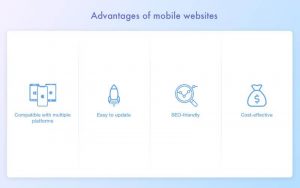February 19, 2019
The Case for a Mobile Website Over a Mobile App
“In 2019, India’s smartphone users number is predicted to reach 1.1 billion.”
In order to reach out to a greater audience, a mobile presence for your brand is very important. And speaking of mobile presence, the first thing that comes to the mind is building a mobile app. It is true that mobile apps are gaining popularity, but it may always not be the correct choice for your brand.
Studies have revealed that “on an average, mobile apps achieve half their lifetime usage in the first six months.” Developing and getting installations is only half the job done, keeping the users engaged is probably the biggest challenge. Moreover, the cost of acquisition per user for a mobile app is quite high and it can be a setback if a business fails to achieve the desired results.
On the other hand, a mobile website can be a much smarter choice with a lower cost of acquisition, which will eventually help you with a greater ROI. It does not have a limited lifespan like an app, and neither can it be deleted - users can come back to the site whenever they want.
[caption id="attachment_10892" align="aligncenter" width="500"] Source: Cleveroad[/caption]
Take a look at the main reasons why a mobile-optimized website can be a smart choice to make for your business -
Source: Cleveroad[/caption]
Take a look at the main reasons why a mobile-optimized website can be a smart choice to make for your business -
 Source: seoexpert[/caption]
Be it a mobile website or an app, the main aim of every business is to reach out to its audience and generate revenue. The choice between a mobile website or an app depends on the objective and nature of your business. If you want to engage, interact and communicate with your audience, for example, an interactive gaming site or a news portal - developing an app is a good choice. On the other hand, if the goal is to provide mobile-friendly content to a wide audience, a mobile website will be more appropriate. To know more about how to make your website mobile-friendly, just leave us a message and we’ll get back to you.
Source: seoexpert[/caption]
Be it a mobile website or an app, the main aim of every business is to reach out to its audience and generate revenue. The choice between a mobile website or an app depends on the objective and nature of your business. If you want to engage, interact and communicate with your audience, for example, an interactive gaming site or a news portal - developing an app is a good choice. On the other hand, if the goal is to provide mobile-friendly content to a wide audience, a mobile website will be more appropriate. To know more about how to make your website mobile-friendly, just leave us a message and we’ll get back to you.
 Source: Cleveroad[/caption]
Take a look at the main reasons why a mobile-optimized website can be a smart choice to make for your business -
Source: Cleveroad[/caption]
Take a look at the main reasons why a mobile-optimized website can be a smart choice to make for your business -
1. Compatibility
In case of a mobile app, different versions need to be made for different operating systems or devices. On the other hand, a mobile website can enhance the same experience across several devices with just one version, thus saving cost as well as resources. The compatibility of such responsive websites will be appreciated by users owning different devices. Moreover, a mobile website can also be integrated with other mobile features such as texting and QR code scanning.2. Greater Reach
Owing to the multi-device support across different platforms, a mobile website is bound to reach a broader audience. A lot of people may not want to download an extra app on their phone or not have enough storage space. In such cases, your brand may not be able to reach out to a broader audience. However, there would not be such a problem if you have a mobile-optimized website.3. Maintenance & Support
The cost of upgrading a website is much lesser compared to an app. With a one-time edit, both content and design can be modified efficiently, without any hassle. Maintaining an app with all the testing, upgrades and compatibility issues involved is much more expensive. Also, after upgradation, the updates on a mobile website are active immediately and visible across all devices.4. Brand visibility & SEO
It is a well-known fact that Google ranks mobile optimized pages on top of search results and every business knows the value of SEO for their brand. Moreover, greater brand visibility leads to higher traffic on the website.5. Easy shareability
Mobile websites can be easily shared among users by just sharing the URL link. It could be via a text message, email or a tweet. Brands can also redirect the audience to a mobile website from a blog or a status update easily. An app, on the other hand, cannot be shared or used so easily. [caption id="attachment_10893" align="aligncenter" width="500"] Source: seoexpert[/caption]
Be it a mobile website or an app, the main aim of every business is to reach out to its audience and generate revenue. The choice between a mobile website or an app depends on the objective and nature of your business. If you want to engage, interact and communicate with your audience, for example, an interactive gaming site or a news portal - developing an app is a good choice. On the other hand, if the goal is to provide mobile-friendly content to a wide audience, a mobile website will be more appropriate. To know more about how to make your website mobile-friendly, just leave us a message and we’ll get back to you.
Source: seoexpert[/caption]
Be it a mobile website or an app, the main aim of every business is to reach out to its audience and generate revenue. The choice between a mobile website or an app depends on the objective and nature of your business. If you want to engage, interact and communicate with your audience, for example, an interactive gaming site or a news portal - developing an app is a good choice. On the other hand, if the goal is to provide mobile-friendly content to a wide audience, a mobile website will be more appropriate. To know more about how to make your website mobile-friendly, just leave us a message and we’ll get back to you. 

